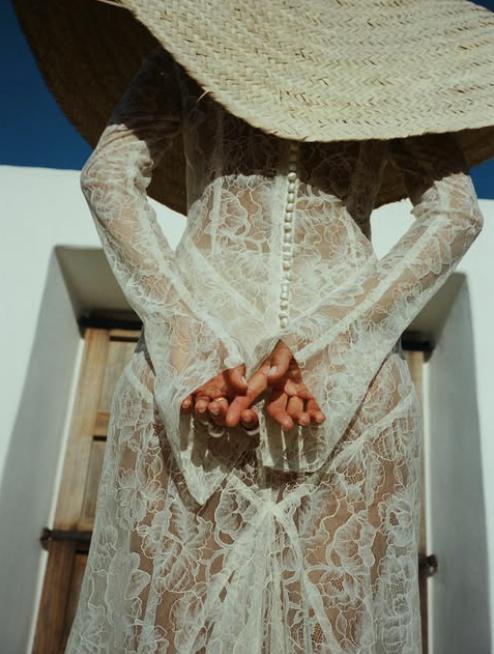The numbers tell the story before the founder even needs to speak. De La Vali, the Ibizan-born cult label known for its bohemian roots and aesthetics, saw its e-commerce sales surging 300% in the past year, with another 180% projected for the year 2025. But behind these impressive metrics lies a deeper transformation — De La Vali is rapidly evolving into a refined global luxury house under the vision of Jana Sascha Haveman.
“This past year has been a time of significant transformation for the brand and myself,” says Haveman, who recently assumed sole ownership of De La Vali at what she describes as “a pivotal time.” The brand, which has quietly built a cult following among the likes from Kendall Jenner to Rita Ora, is now entering its most ambitious phase yet.
Over what felt like merely months in the past year, De La Vali underwent a notable glow-up, and launched multiple sold-out collections from SS25 to PF25, a new bridal range, and a flagship store comfortably tucked in the heart of London’s Carnaby Street. Its signature aesthetics — romantically empowered with day-to-night versatility — have been refined and elevated: think advanced tailoring, premium fabrics and intricate laces, as well as elaborate designs sparing no details. Even the label’s digital presence has been meticulously revamped, with content pillars and tones supporting the identity of the uprising De La Vali 2.0.
Originally founded in Ibiza in 2017, De La Vali emerged from the island’s intoxicating blend of freedom and sophistication that defined Haveman’s unconventional upbringing. “My parents, who I would describe as glamorous hippies, were very social, so I was constantly surrounded by a vibrant mix of colourful characters,” she says. And it wasn’t just any Mediterranean childhood — growing up in 1990s Ibiza meant befriending families who lived in beach caravans, an experience that was simply “the norm back then.”
“I think the freedom I witnessed growing up has had a huge impact on me not only as a designer but also as a person,” reflects Haveman.
The brand’s DNA traces directly to Haveman’s mother, whose style she describes as “the epitome of effortless bohemian island aesthetic but with an added layer of decadence and romance.” This maternal influence, combined with the island’s magnetic energy, created what would become De La Vali’s unique charm that drew the mass following: elevated bohemian pieces that transition seamlessly from beach to bar, appealing to women who, as Haveman puts it in the past, are “magnetic, majestic, mystical.”
In a world that’s becoming increasingly digital by the day, the opening of De La Vali’s London boutique may seem counter intuitive, especially factoring in the resources required for an independent brand. But Haveman is confident that the opening represents more than retail expansion — it’s a strategic move to understand and cultivate the brand’s customer base in real life. “Opening our Carnaby store has been a game changer,” Haveman explains. “It’s been incredibly insightful and rewarding to connect directly with our customer and gain a deeper understanding of who she is and what she wants.”
The boutique features expanded offerings including jewelry, coffee table books, and exclusive prints of 1970s Ibiza. “We begun using our platform to spotlight other designers and objects that inspire us and complement our collections,” explains Haveman, outlining a retail strategy that aligns with De La Vali’s broader evolution toward “a more deliberate, slower design process.”
The expansion strategy doesn’t stop there. Following a couple high profile events held in London and Ibiza attended by celebrities and key opinion leaders in the industry, Haveman reveals that De La Vali have secured key U.S. wholesale partners set to launch later this year, with further global activations and pop-ups in the works while broadening the label’s product offering to include separates, knitwear, outerwear, and accessories. “This evolution will unfold gradually and with intention, always staying true to the essence of De La Vali,” Haveman emphasizes.
For an entrepreneur who admits she “didn’t study fashion” and “had never worked in a traditional office job,” Haveman’s journey from creative impulse to business leader might show an accidental masterclass in authentic brand building. “Everything I know, I’ve learned on the job,” she says. “At this point in my career, I feel like I’ve been around the merry-go-round. I’ve made mistakes, learned invaluable lessons, and come out the other side with clarity and purpose.”
“I’m now ready to do things in my own way with confidence, intention, and integrity,” she concludes — a philosophy that may well define the next chapter of contemporary luxury fashion.

